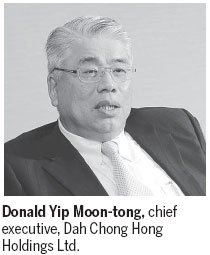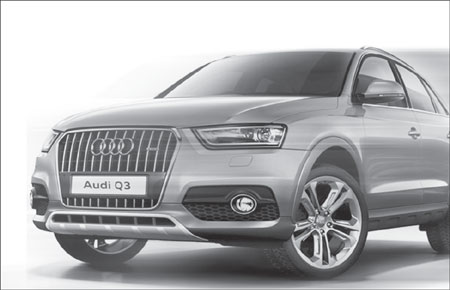Dah Chong Hong bullish about mainland auto market prospect
Updated: 2012-12-21 07:08
By Sophie He(HK Edition)
|
|||||||
|
Audi, one of the brands distributed by DCH on Chinese mainland. Provided to China Daily |
Corporate Strategy
Dah Chong Hong Holdings Limited (DCH), a leading auto distributor on the mainland and in Hong Kong, is bullish about the Chinese mainland's auto market and sees it expanding by 15 percent annually over the next five years.
"The per capita income of mainland people is increasing rapidly, while the car prices are decreasing, and the per capita car ownership on mainland is still very low," Donald Yip Moon-tong, chief executive at DCH, told China Daily.
"Although the domestic auto market's growth rate may not be able to maintain a high 20 to 40 percent level as it used to be, I believe the market will expand by around 15 percent every year for the next five years," said Yip.
But he admitted that due to the undesirable macroeconomic environment, the motor sales industry's performance on the mainland is not very good this year and the growth pace has slowed down, but he still expects the mainland's motor sales market to grow by 7 to 9 percent in 2012.

During the first half of the year, while the overall motor market on the mainland expanded by 2.9 percent to 9.6 million units, DCH outperformed the market with a 13.9 percent increase in unit sales. A total of 41,155 units were sold on the mainland, according to DCH's interim report.
Despite the turnover increasing by 25 percent from the motor and motor related business on the mainland during the first half, the profit after tax segment dropped 26.1 percent, due to the keen competition in the motor dealership business resulting in lower gross margin on new car sales.
The motor sales industry's business environment was very difficult since the end of last year, and the inventory level at (4S) stores across the country was very high, forcing DCH and its competitors to offer discounts in order to promote sales.
"But the market condition is turning better in the second half of this year," said Yip, explaining that the selling prices have increased and the car manufacturers also stepped up actions to protect their dealers.
Under the impact of the fierce competition as well as the uncertainty of the economic situation, DCH also slowed down the pace of its expansion.
Yip said that by November 20, DCH had only opened three 4S stores on the mainland, and another four to five 4S stores are expected to be opened by the end of this year. But the company maintains its target of opening 15 new 4S stores each year over the next three years.
To open a 4S store for mid-range cars in China, the investment is around 20 million yuan, while an investor needs up to 70 million yuan to open a 4S store for high-end cars, said Yip.
"According to our experiences, on average, a new 4S store will break even within two years after the opening," said Yip.
When asked whether the tension between China and Japan over Diaoyu Islands had any negative impact on DCH's motor sales, Yip admitted that the issue had impacted the sales of Japanese cars, especially in September and October.
"By now (November 20), the overall sales volume of Japanese cars (at DCH) is still lower than normal."
Eva Yip, an analyst at Sun Hung Kai Financial, who issued a report after she met DCH's management in mid-November,said that Japanese auto OEMs have reported 40 to 60 percent year-on-year declines in auto sales amid Sino-Japan tensions, but DCH says its sales of Japanese autos were only hit mildly in September and October.
"Overall, same-store-sales growth (at DCH) was positive owing to solid sales of European and American brands. Margins from new-car sales are low and we expect auto OEMs to provide support in the form of rebates," Eva Yip wrote.
DCH generates 70 percent of sales from its China auto business with one third of this from auto distributorship and two thirds from dealerships. Around 50 percent of dealership volumes are from selling Japanese brands, according to the report.
Aside from auto sales business, DCH, which is also a major food distributor in Hong Kong and on the mainland, said the company is actively expanding its food distribution network on the mainland. Yip sees the food business segment growing by 30 to 40 percent on the mainland this year.
"Food (distribution) is a very stable business for DCH group," said Donald Yip, adding that he sees the business segment recording a stable growth in Hong Kong, as the market is relatively mature, while the potential for this business to grow on the mainland is great.
sophiehe@chinadailyhk.com
(HK Edition 12/21/2012 page2)
